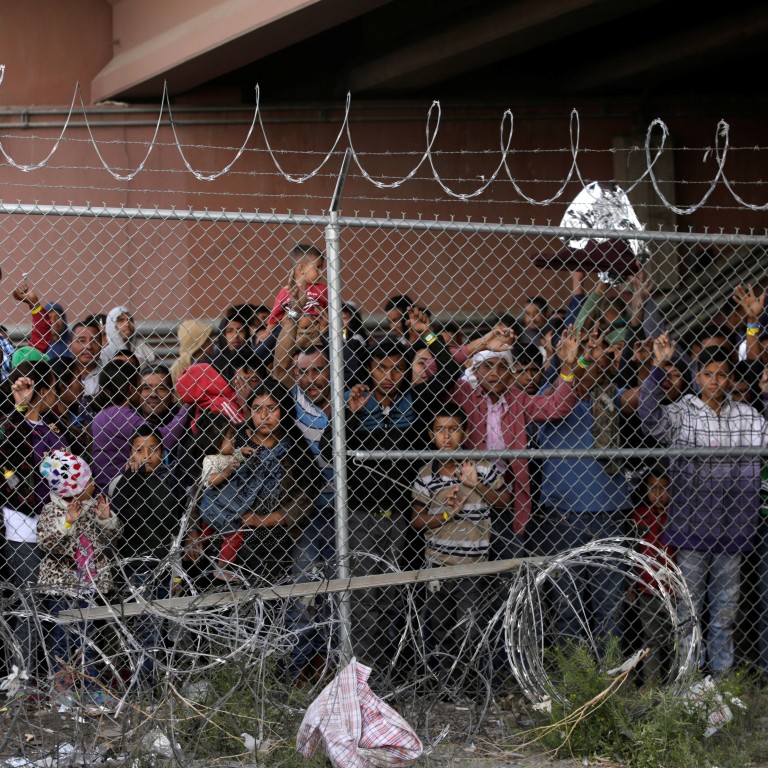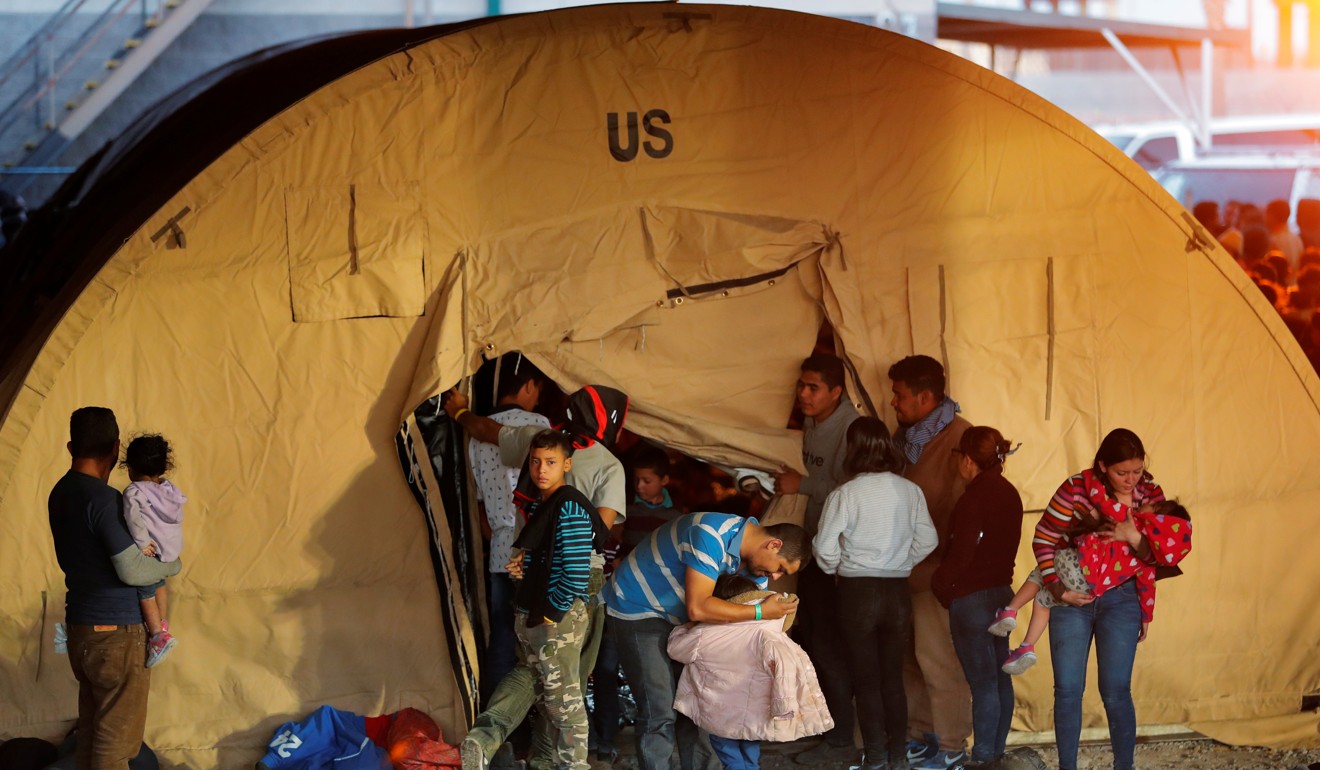
US immigration hell: cold and hungry migrants tell of being held in a barbed wire enclosure, under a bridge in El Paso, Texas
- In a Texas border town, migrants subjected to Donald Trump’s hardline approach are enduring appalling conditions
For three days and nights, Maria and her 14-year-old son were penned behind barbed wire, under a bridge in El Paso.
Cold, hungry, surrounded by sick and crying babies and with only the stony ground for a bed, her first experience of America was not as she had imagined.
“I came here to work and get a better future for my family,” she said.
“I never thought I would go through this.”
Maria (who is from Guatemala and who requested The Guardian not use her real name) and her son are among hundreds of Central American migrants who have been detained by US immigration agents in an area of dirt under the Paso del Norte bridge.
The full brutality of the conditions in this makeshift prison-cum-shelter is only now starting to emerge.
Reporters are being kept away from the area under the bridge, which connects El Paso with Ciudad Juarez in Mexico.
But migrants who have been held there, some for hours, others like Maria for several days, have begun to tell their stories.
Donald Trump cuts foreign aid to El Salvador, Guatemala, and Honduras over US-bound migrants
The hunger and the cold are the worst of it, Maria said. At night a cruel wind whips underneath the bridge, kicking up dust and stinging eyes and skin.
There is a large tent in the middle of the detention area, but as families told BuzzFeed News it isn’t large enough to accommodate everybody and some have had to languish outside.
Maria said border patrol agents handed out metal thermal sheets – again with insufficient supplies.
Many of those cooped under the bridge are women and children. On Saturday The Guardian observed a line of about 20, led in single file by a Customs and Border Protection (CBP) officer. They were led into the barbed-wire area, then the gate closed behind them.

Maria and her son, who also asked to remain anonymous, fled Guatemala because of crime and the lack of jobs, she said.
They paid US$8,000 to coyotes to be taken north, the money raised from her extended family and by putting a lien on her home.
Once they got to the US border they were held under the bridge from Monday evening until Thursday afternoon.
Trump’s border wall ‘is never going to happen’, says Mexican psychic
“We were hardly able to sleep, the earth was so hard, it was very tiring,” she said.
“There were so many young babies crying, a lot of the children were sick with coughing, diarrhoea, eye infections.”
“We were hungry all the time,” her son said.
“They gave me a cold baloney sandwich at four in the morning, and then another cold baloney sandwich at 1pm, and that was it.”

The border crossing at El Paso, a city of almost 1 million, has become ground zero for Donald Trump’s crackdown on immigration as well as opposition to it.
On Saturday, Beto O’Rourke, an El Paso native and a leading contender for the Democratic presidential nomination, officially launched his bid to unseat Trump just four blocks away from where Maria had been detained.
He attacked Trump for sowing “fear and division” and said of the migrants who have been corralled behind the wire: “They are our fellow human beings, and deserve to be treated like our fellow human beings.”
Trump has made El Paso a target of his anti-immigrant rhetoric. In February, amid tension over his demands that Congress fund a border wall, he travelled to El Paso and derided it as having one of the highest crime rates of any big US city.
The claim was untrue.

Over the weekend the president responded to the rising number of undocumented migrants turning up at the El Paso crossing by saying he was considering closing the border altogether this week, a move which could have severe economic consequences for the US and Mexico.
He also threatened to cut aid to the three Central American countries that are the source of most of the migrants presenting at the border. That however is likely to face opposition in Congress.
Nobody disputes the fact that many more migrants have been arriving at the international bridge in recent weeks, largely from Honduras, Guatemala and El Salvador. The surge has been so sharp that Kevin McAleenan, the CBP commissioner, last week said the system was at “breaking point”.
Luis Torres, a volunteer with the Centro Cristiano Candico Nuevo which cared for Maria and her son after they were released by CBP, said that for the past five weeks they have offered shelter in their church to more than 300 people – a huge increase.

But he was suspicious of the cause. It had happened so suddenly, he said, that he and other volunteers had begun to wonder whether Trump himself was behind it.
“I think it’s being done by Trump’s people, as a way of increasing the chaos,” he said.
Torres conceded that he had no evidence to support this startling theory. But a similar point is being made more mutedly by some of Trump’s political critics, who say the administration is aggravating the situation with its crackdown policies.
Veronica Escobar, the Democrat who replaced O’Rourke as El Paso’s representative in Congress, told reporters on Friday CBP’s handling of the migrants showed a crisis of leadership.
“This administration has made a challenge into chaos because of the policies that they have chosen to enact,” she said.
“Having people corralled under a bridge out in the elements with half of them being children is absolutely inhumane and unacceptable and is not representative of who we are as a country and is not reflective of the kind of resources that Congress has given CBP and homeland security.”
As for Maria and her son, they boarded a Greyhound bus on Saturday night. It would take them to Indianapolis, where friends were waiting – as was an immigration court that has already booked a date to hear their case.

